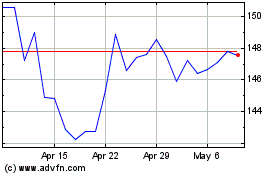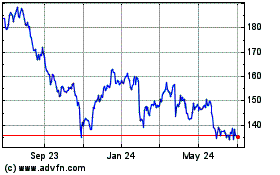By Peter Nicholas and Laura Stevens
WASHINGTON -- President Donald Trump stepped up his attacks on
Amazon.com Inc. on Tuesday, saying the company was profiting at the
expense of taxpayers and putting traditional retail stores out of
business.
Amazon, he wrote in a morning tweet, "should pay these costs
(plus) and not have them bourne [sic] by the American
taxpayer."
The tweet was the fifth in as many days that Mr. Trump has aimed
at Amazon, whose stock has been buffeted by the president's
focus.
In his latest tweet, Mr. Trump also targeted the Postal Service
over what he said are the multibillion-dollar losses stemming from
Amazon deliveries.
"P.O. leaders don't have a clue (or do they?)!" he wrote.
In his tweets, Mr. Trump has invoked many of the same themes:
Amazon profits at the expense of the Postal Service and other
retailers suffer because of Amazon's enviable market position.
He has also spotlighted the ties between Amazon and the
Washington Post. Jeff Bezos, chief executive of the company also
owns the Washington Post.
In tweets over the past year he has complained repeatedly about
the newspaper's coverage while also suggesting without evidence the
Post is a "lobbyist" for Amazon.
An Amazon spokeswoman declined to comment. The U.S. Postal
Service also declined to comment.
In remarks Monday, Washington Post Executive Editor Martin Baron
said the newspaper operates independently from Amazon and that Mr.
Bezos hasn't meddled in the Post's news coverage.
"I can't say more emphatically he's never suggested a story to
anybody here, he's never critiqued a story, he's never suppressed a
story," Mr. Baron said in an interview with the New York Times.
Amazon's stock price has taken a hit over the past week, hurt by
a broader stock-market slump and a news report regarding Mr.
Trump's anger with Amazon on Wednesday. Since the market's close a
week ago, the company's stock price has fallen 8% as of
Tuesday.
In a meeting later Tuesday at the White House with the Baltic
States heads of government, Mr. Trump once again attacked Amazon's
practices.
"We're giving a subsidy to Amazon," Mr. Trump said. "Take a look
at the Post Office. The Post Office is losing billions of dollars.
The taxpayers are paying for that money."
The president suggested he would take action to force Amazon to
pay higher rates to the Postal Service.
Under law, the U.S. Postal Service must pay its own way. It
doesn't receive an annual taxpayer subsidy, but it is reimbursed by
Congress for some services such as delivering mail to the blind and
overseas voters.
While the U.S. Postal Service does lose billions of dollars
annually, much of that is attributable to an unusual requirement to
prefund some retiree liabilities, mandated by Congress before the
financial crisis. To stay afloat, the agency has defaulted on
billions of this prefunding.
The Postal Service also has been hard-hit by a decline in
first-class mail, one of its most profitable products. And the
service has also used up a $15 billion credit line with the
Treasury Department.
Amazon primarily uses the Postal Service for so-called last mile
delivery, where they sort and drop off packages at the local post
office and the letter carrier brings those to the door. United
Parcel Service Inc., FedEx Corp. and a few other companies have
similar agreements with the quasigovernmental agency.
The package business has helped bolster the Postal Service's
financial strength, according to officials, and the Postal Service
is mandated by Congress to charge enough to cover its costs. But
some critics have said officials have priced this type of delivery
option too low, effectively cross subsidizing package delivery with
its mandate to delivery mail to U.S. addresses.
Mr. Trump also lamented Tuesday what he said was Amazon's effect
on other businesses. "You have retailers all over the United States
are going out of business," he said. "You look at these small towns
where they had a beautiful Main Street -- the stores are all
gone."
Many smaller retailers shut down years ago before online
shopping took off. While larger retailers like Macy's Inc. and Best
Buy Co. have recently closed stores, and Toys "R" Us Inc. is
preparing to liquidate all of its U.S. stores, it is unclear how
much of that might be attributable to Amazon. The online retail
giant commands about 43% of U.S. e-commerce spending, but it
garners 4% of total retail domestically, according to
eMarketer.
White House aides have noted that the president's tweets on the
subject have put the White House on the offensive, rather than
defending itself against stories including allegations by former
adult-film star Stormy Daniels and other women.
In private meetings with friends and aides, Mr. Trump often
expresses annoyance with Amazon and what he sees as its
exploitative practices, they say. He mentioned Amazon at a small
dinner the White House held last week with political allies and
aides.
A possible motivation for the Amazon attacks is Mr. Trump's
unhappiness over the Washington Post's coverage, one person who
talks to him regularly said. "He correlates the two of them
together," this person said.
"He's talked about the fact that the Washington Post is solely
owned by Jeff Bezos, and he [Mr. Bezos] is using that same entity
to take on the president and the administration," this person
said.
In past tweets, Mr. Trump has also accused Amazon of not fully
paying sales taxes, giving it an unfair advantage over traditional
retailers. Amazon has said it collects sales taxes on its own
inventory in all 45 states that have such a tax and has voluntarily
started collecting taxes in some municipalities.
Policy experts say that any attempt to target Amazon on grounds
of anticompetitive behavior would be a long shot.
--Rebecca Ballhaus contributed to this article.
Write to Peter Nicholas at peter.nicholas@wsj.com and Laura
Stevens at laura.stevens@wsj.com
(END) Dow Jones Newswires
April 03, 2018 15:26 ET (19:26 GMT)
Copyright (c) 2018 Dow Jones & Company, Inc.
United Parcel Service (NYSE:UPS)
Historical Stock Chart
From Mar 2024 to Apr 2024

United Parcel Service (NYSE:UPS)
Historical Stock Chart
From Apr 2023 to Apr 2024
